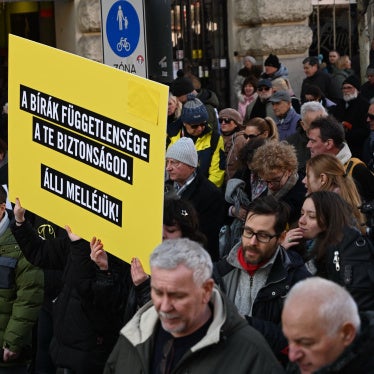Canadian officials should challenge Kazakhstan’s President Nursultan Nazarbaev on the country’s deteriorating human rights record, Human Rights Watch said today.
Nazarbaev is making an official visit to Canada this week. While in Canada, he is meeting with Prime Minister Jean Chrétien and top business leaders. The Toronto Committee of Human Rights Watch urged Canadian officials and the business community to press President Nazarbaev to address the human rights crisis in his country.
“Kazakhstan’s vast energy wealth has made it an important geostrategic partner for many countries, but it has not made the country more democratic,” said Clayton Ruby, co-chair of Human Rights Watch’s Toronto Committee. “Instead, the government is trying to protect its monopoly on political and economic life by undermining basic freedoms.”
Human Rights Watch said Canadian officials and business leaders should impress upon President Nazarbaev that these freedoms are essential on their own merits and for stable development.
Recent Human Rights Watch field research in Kazakhstan found that the government has led a crackdown on opposition political parties, the media, and certain nongovernmental organizations in a drive to limit political competition.
Police have arrested and harassed members and supporters of two of Kazakhstan’s more dynamic and well-funded political parties. Fourteen opposition party members and supporters now face arbitrary civil and criminal charges, in some cases in order to prevent them from running for public office; most are from the Democratic Choice of Kazakhstan (DVK) and the Republican People’s Party of Kazakhstan (RNPK). The DVK leader, Galymzhan Zhakianov, is serving a seven-year sentence on abuse of office and financial mismanagement charges following a trial that international experts found to be deeply flawed. The RNPK leader has been living in exile.
Opposition activists also face threats of job dismissal in retaliation for their political involvement, police actions to preventing them from organizing and attending party gatherings, and sometimes intimidating visits from law enforcement and security agents.
Mostly due to a new law on political parties, the number of political parties dropped this year from nineteen to seven.
“The trend is clear—the Kazakh government wants to avoid genuine political competition so that it cannot be held accountable to the public,” said Ruby.
Kazakhstan could have as much as 30 to 50 billion barrels of oil and has attracted considerable investment in the hydrocarbons sector. But high-level government officials have been implicated in corruption scandals involving oil revenues. Allegations emerged in 2000 that the Kazakh government secretly held about U.S. $1.4 billion in Swiss bank accounts. Also, a U.S. federal court has indicted two American businessmen on charges of corruption in their transactions with energy deals.
The Kazakh government is eager to stop exposure of corruption scandals involving oil contracts, and to avoid transparency of oil revenues. Editors and journalists who tackle these and other controversial topics have been victims of attacks and beatings by unknown individuals. The government also targets them for criminal libel cases. One of them, Sergei Duvanov, is now serving a three-year prison term on charges of statutory rape, following a deeply flawed trial. Duvanov had also been the target of an anonymous attack and a criminal libel suit.
The government is now adopting new measures to control the work of nongovernmental organizations that work on sensitive issues. It harasses them though intimidating police visits, arbitrary investigations by the tax police, and surveillance by law enforcement and security agents. The government has also resisted efforts at full transparency of how oil revenues are spent.
“As the country’s wealth grows, the government is misusing revenue, consolidating power, and closing political space. Kazakhstan is starting to look like another case study in how oil windfalls bolster dictatorships rather than foster democracy,” said Ruby.
Human Rights Watch called on Canadian officials to urge President Nazarbaev to have Galymzhan Zhakianov and Sergei Duvanov released, pending an independent review of the charges against them, and to foster a more constructive environment for the media and political parties.
Kazakhstan has won international praise for achieving rising GDP growth, stabilizing its macroeconomic situation, and receiving a Moody’s investment grade, the first country of the former Soviet Union to do so. But at least 27 percent of the population still lives below subsistence level, and many social indicators have dropped or remained low.
“In the wake of an oil boom, it looks like the benefits are concentrated in the hands of a few who are more than willing to crack down on the rest,” said Ruby.







